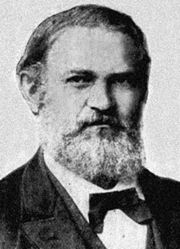
Franz Eilhard Schulze
Encyclopedia

Greifswald
Greifswald , officially, the University and Hanseatic City of Greifswald is a town in northeastern Germany. It is situated in the state of Mecklenburg-Vorpommern, at an equal distance of about from Germany's two largest cities, Berlin and Hamburg. The town borders the Baltic Sea, and is crossed...
. He studied at the universities of Bonn
University of Bonn
The University of Bonn is a public research university located in Bonn, Germany. Founded in its present form in 1818, as the linear successor of earlier academic institutions, the University of Bonn is today one of the leading universities in Germany. The University of Bonn offers a large number...
and Rostock
University of Rostock
The University of Rostock is the university of the city Rostock, in the German state of Mecklenburg-Vorpommern.Founded in 1419, it is the oldest and largest university in continental northern Europe and the Baltic Sea area...
. In 1863, he received his doctorate from Rostock, and subsequently became a lecturer of anatomy
Anatomy
Anatomy is a branch of biology and medicine that is the consideration of the structure of living things. It is a general term that includes human anatomy, animal anatomy , and plant anatomy...
as well as prosector
Prosector
A prosector is a person with the special task of preparing a dissection for demonstration, usually in medical schools or hospitals. Many important anatomists began their careers as prosectors working for lecturers and demonstrators in anatomy and pathology....
there. In 1871 he established the zoological institute of the University of Rostock. Later he was a professor at the Universities of Graz
University of Graz
The University of Graz , a university located in Graz, Austria, is the second-largest and second-oldest university in Austria....
and Berlin
Humboldt University of Berlin
The Humboldt University of Berlin is Berlin's oldest university, founded in 1810 as the University of Berlin by the liberal Prussian educational reformer and linguist Wilhelm von Humboldt, whose university model has strongly influenced other European and Western universities...
.
In 1872, he took part in the Pomerania expedition to the North Sea
North Sea
In the southwest, beyond the Straits of Dover, the North Sea becomes the English Channel connecting to the Atlantic Ocean. In the east, it connects to the Baltic Sea via the Skagerrak and Kattegat, narrow straits that separate Denmark from Norway and Sweden respectively...
.
For several years during the 1890's, he was president of the German Zoological Society (Deutsche Zoologische Gesellschaft).
Schulze is remembered for his investigations of the anatomy and developmental history of invertebrates, particularly his research and publications involving sea-sponges. He was especially interested in a class of sponges known as Hexactinellida, which he studied from collections taken from the U.S. Albatross Expedition and the British Challenger Expedition
Challenger expedition
The Challenger expedition of 1872–76 was a scientific exercise that made many discoveries to lay the foundation of oceanography. The expedition was named after the mother vessel, HMS Challenger....
of 1873-76. Schulze also did important studies of xenophyophores, which are delicate sponge-like protozoans.
Selected works
- Amerikanische Hexactinelliden nach dem Materiale der Albatross-Expedition. Jena 1899
- Hexactinellida. Jena: G. Fischer, 1904
- Die Xenophyophoren der Siboga-Expedition. Leiden: Brill, 1906

